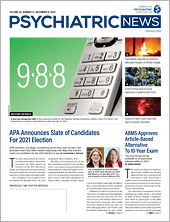In moments between sessions, when I’ve finished writing my notes, thoughts emerge in my mind questioning my fundamental foundations of knowledge and my abilities in helping those who seek out psychiatric care. More often than would be expected, a distressing theme resonates in the quiet of my office. What on earth am I doing?
Residents and medical students often speak of imposter syndrome—the anxiety-producing condition that leaves one feeling inept despite years of experience and learning. Understanding first how little we know opens a path in the hope that the void, filled with defenses of being found out, will be replaced with the knowledge that resides in our books and the wisdom written in the histories of our mentors. Something I don’t think I grasped until recently, however, is the unwavering, devastating feeling that the sense that one knows nothing never really goes away. It seems to persist indefinitely.
My memory is a sieve to the information that overwhelms me. There are other psychiatrists I meet who amaze me at how much they can retain in the forefront of their mind. Medicinal facts and psychotherapy pearls for me sometimes feel like taped-up boxes stored away in the dusty corners of my brain. Where does this doubt come from, and does it serve a purpose?
In talking with a patient, or for that matter with anyone, I am keenly aware of the multitude of steps that information must pass through for basic verbal communication to occur. Individuals have a thought they want to express—formed through their history, current perceptions, and mood—only to be spoken after lightning-fast revisions edit the final content of their language. My ear, on the receiving end, hears the soundwaves of words in their purist form. Sadly, their fate is to be bastardized as they move through my own history, perceptions, and mood. It all congeals into a state of trying to understand the meaning of what was spoken. Given the nuances of other forms of nonverbal communication, the potential distortions on both ends are endless. Knowing all this, I am told by my common sense that the best way to control any aspect of this confusing equation is to attempt to know myself in the most complete way I can.
Years of psychotherapy, including several years of analysis, have opened my mind to my own instincts and behavior—or what I know of them so far. Psychotherapy, above all other forms of training, has helped me to understand most comprehensively how the human brain works, insofar as I have examined my own. The id, ego, object, and self fuel the passion that forms the basis of relationships—our connection with others in the vast empty space of life. It is our relationship with others, and furthermore with ourselves, that often leads to conflict and takes people on a search for relief. My work with patients is not only an attempt to understand them but also to further explore my own self as it changes through time. We are all a work in progress, and if we are observant of our work and appreciate how our own knowledge, complex histories, imperfections, and dreams define us, then we may just have hope to help others in their journey. It is our relationships with patients that are the healing factor.
Going back to my office and the in-between sessions when the bugaboo thoughts of my being an imposter pervade me, I reflect back on the many times I’ve had these thoughts before. I think about who I am, where I have been, where I am now, and potentially where am I going. Those different versions of myself make up who I am, along with the integrated objects of my many mentors. When we get lost in the muddy reality of practicing psychiatry, it is relieving to know we are not alone in our struggles to do what is best. We must know ourselves, trust ourselves, and do what we can with what we have. ■

